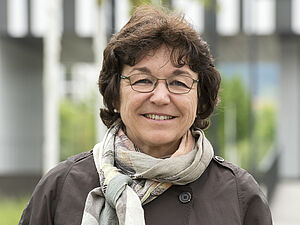"The pivotal question is not addressed openly enough"
50th anniversary voices
Eva Reinhard has been Head of Agroscope, Switzerland's state institute for agricultural research, since 2018. With a doctorate in biology, she gained extensive research experience at various universities and later moved into administration. Before taking up her position at Agroscope, she was Deputy Director of the Swiss Federal Office for Agriculture
How would you describe your personal relationship with organic farming?
I don't have a personal relationship with organic farming in the narrower sense. I find the development that organic farming has undergone exciting and I consciously buy organic products. Not always, but every now and then. As head of Agroscope, I am particularly interested in FiBL's research and knowledge transfer at various levels - agronomically, economically and sociologically; but also, in the strong regulation of this labelled production and its consequences for production and the market.
What are your connections to FiBL?
We have great joint research projects with very competent researchers on both sides. My closest personal point of contact with FiBL is the National Organic Research Forum (NBFF), where I represent Agroscope on the steering committee. This platform takes up the needs of organic practice and is an important steering element for research, especially for its practical relevance. At the same time, the NBFF is also a place where people get to know each other, exchange ideas and create new ones.
Do you see FiBL as a competitor for research funding or rather as a fellow campaigner on the path to sustainable development in the agricultural and food sector?
Definitely as a fellow campaigner. The challenges that the agriculture and food sector are faced with are so important that it makes no sense to go at it alone, neither nationally nor internationally. Researchers need to network in order to be able to offer functioning solutions in the overall system, which is why consortia are generally being increasingly promoted. Of course, we are sometimes competitors, but that is normal in research -- it’s invigorating and energising.
There are already various projects in which FiBL and Agroscope are working together. Do you think this collaboration should be intensified?
I am sure of it. Conventional and labelled cultivation systems, for example organic or IP (integrated production, editor's note), are moving closer together as the demands on food production generally increase. As a result, research in conventional and organic agriculture has more and more common visions, goals and problems to solve. As mentioned above, going at it alone makes little sense. Cooperation creates added value. FiBL and Agroscope have a lot to gain from each other, and so does the Swiss agriculture and food industry.
Where do you see FiBL's greatest strengths?
FiBL took on a pioneering role 50 years ago and has built up a strong position as a result. It is not afraid to conduct research outside the mainstream, it is enterprising, innovative, and thinks and carries out research within the overall system. As the organic movement is generally not criticised as much as conventional agriculture, its reputation among the general public is also very good. FiBL is closely linked to the producers and has a good relationship with its partners in the value chain.
In which areas do you still see potential for improvement?
A strong position, as described above, can be dangerous. You can't rest, you have to keep developing, keep your eye on the ball and remain open to new technologies. In my opinion, the pivotal question of how to increase yields in organic farming is not addressed openly enough. Ideologies must not slow down research. I also see the risk that the strong regulation of the organic label could hinder the further development of FiBL and the entire movement.
What are your wishes for FiBL for the next 50 years?
I wish FiBL another 50 years of success: motivation and ideas for improvements, commitment, the courage to try new things and also the openness to question the status quo. And, of course, I wish it many great research successes, also together with Agroscope, which will make our agriculture and food industry more sustainable – whether organic or conventional. I am sure that FiBL will be able to defend its important position with many successes.




